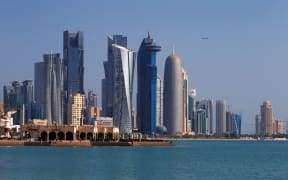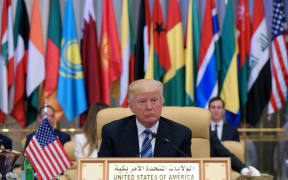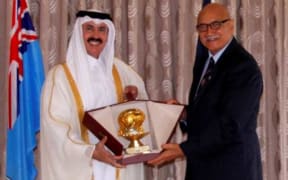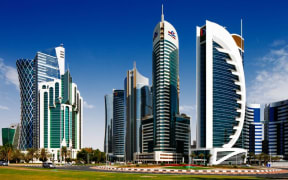Saudi Arabia, the UAE, Bahrain and Egypt have voiced disappointment at Qatar's rejection of their ultimatum, but are so far refraining from further sanctions on the state.
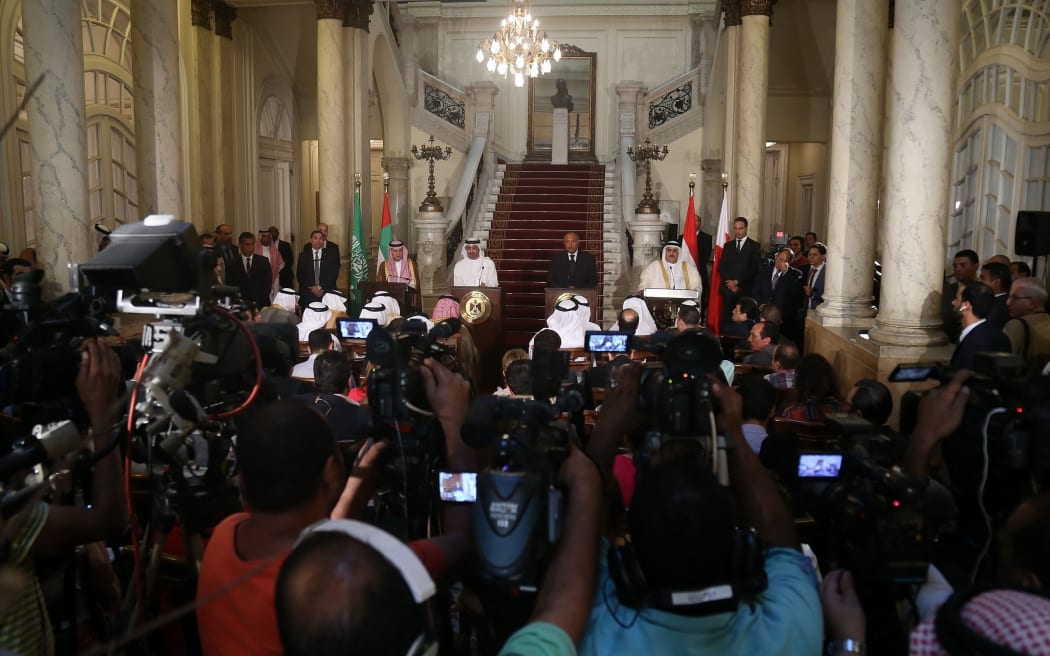
Saudi Arabian Foreign Minister Adel bin Ahmed Al-Jubeir, UAE Minister of Foreign Affairs Abdullah bin Zayed Al Nahyan, Egypt Foreign Minister Sameh Shoukry and Bahrain Foreign Minister Khalid bin Ahmed Al Khalifa hold a joint press conference following their meeting in Cairo, Egypt. Photo: AFP
The Four Arab states said their boycott of the tiny Gulf nation would continue, however.
They severed ties with Qatar a month ago, saying it supported terrorism and was allied with regional foe Iran, accusations Doha denied.
Their foreign ministers met in Cairo on Wednesday after a deadline they gave Qatar to meet 13 demands expired.
Those demands included that Qatar curtail support for the Muslim Brotherhood, shut down the pan-Arab Al Jazeera satellite TV channel, close a Turkish military base and downgrade its relations with rival Iran.
Qatar accused them of "clear aggression" today and said the accusations "were clearly designed to create anti-Qatar sentiment in the West".
Qatar's response to the demands has not been made public.
The four states had been expected to consider further sanctions at the gathering, but announced no new measures.
"The response the four states got was overall negative and lacked any content. We find it did not provide a basis for Qatar to retreat from its policies," Egyptian Foreign Minister Sameh Shoukry said, reading out a joint statement after the meeting.
Shoukry later told an Egyptian privately-owned broadcaster that the demands were non-negotiable.
"The matter from the beginning was not up for negotiations ... there is no middle ground," he said.
The foreign ministers said they would meet again soon in the Bahraini capital, Manama, but gave no date. Intelligence chiefs from the four countries also met in Cairo on Tuesday night, officials said.
"The political and economic boycott will continue until Qatar changes its policies for the better," Saudi Foreign Minister Adel al-Jubeir told a news conference.
UAE minister of state for foreign affairs Anwar Gargash said in a tweet Qatar faced "greater isolation, incremental measures and reputational damage" if it did not heed the demands.
"For any real discussion with Doha to gain traction, it has to be responsible for past actions and recognise the necessity of changing course.
"The message from Cairo is zero tolerance for terrorism, (a) powerful message from Arab world to international community. Qatar can't miss the bus," Gargash said.
Turkey backs Qatar with supplies, troops
Turkey, the biggest regional power to stand by Qatar, has sent 100 cargo planes with supplies to Doha since its neighbours cut air and sea links. It has also rushed through legislation to send more troops to its base in Doha.
Two contingents of Turkish troops with columns of armoured vehicles have arrived since the crisis erupted on June 5.
Turkish President Tayyip Erdogan on Wednesday dismissed calls for closure of the Turkish military base and said the list of Arab demands amounted to an unlawful intervention against Qatari sovereignty.
Saudi Arabia's Jubeir said he hoped Turkey would stay neutral and Egypt's Shoukry rejected any non-Arab interference.
Qatar along with Turkey backed a Muslim Brotherhood government in Egypt before it was overthrown in 2013.
Egyptian President Abdel Fattah al-Sisi spoke with US President Donald Trump by telephone about Qatar, Sisi's office said on Wednesday.
"The visions of the two presidents on dealing with current regional crises were in line, especially when it comes to reaching political settlements which contribute to regional security and stability," Sisi's office said in a statement.
Mr Trump has voiced concern to both sides. Qatar, a small peninsular country protruding into the Gulf, also hosts the biggest US military base in the region as a bulwark against Iran.
Qatari foreign minister Sheikh Mohammed bin Abdulrahman al-Thani told a session of London's Chatham House think tank that Doha was continuing to call for dialogue to settle the dispute.
He said this was "despite the separation of 12,000 families, despite the siege that is a clear aggression and an insult to all international treaties, bodies and jurisdictions."
